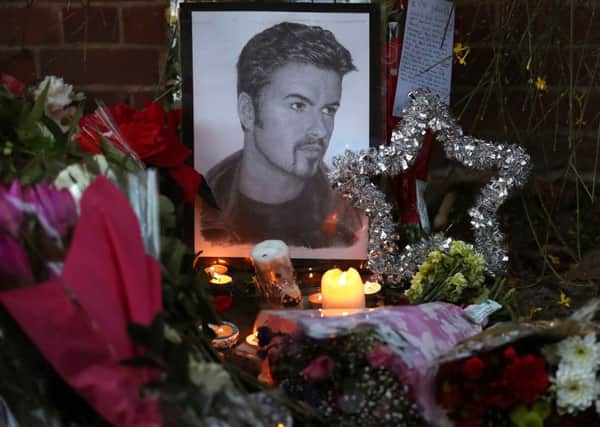Jayne Dowle: Time that we got celebrity deaths like George Michael into perspective


His timing, as always, was impeccable. Last Christmas? It was for him. Nobody will ever watch that video of a much younger Michael frolicking in the snow with Pepsi and Shirley in the same way again. An excellent songwriter and performer, he achieved many accolades, not least of which was the invention of the Christmas jumper as a cool item of clothing.
Sadly too, his death came on Christmas Day, at the end of a year which saw the loss of more “celebrities” and musicians than the average 12 months. David Bowie, Leonard Cohen, Rick Parfitt… all gone now.
Advertisement
Hide AdAdvertisement
Hide AdRead into that what you will, assume that the end of the world is nigh if you must, but there is a strong argument to support the theory that if you live your life a certain way for long enough, you won’t live for ever.
George Michael’s death was not the end of civilisation as we know it. Yet you wouldn’t have thought this if you had seen my Facebook feed as the story broke. Fully-grown women – and more than a few men – were virtually weeping, posting pictures of a wholesome-looking Michael in his Wham! heyday and lamenting his demise in excruciating detail involving memories of school discos and dodgy Eighties nightclubs.
I will be kind and put much of the emoting down to the amount of alcohol consumed by this point on Christmas Night. How many people actually knew George Michael so intimately that his death could affect them so?
If reports are to be believed, not many. In recent years he had become almost a recluse in his multi-million-pound home in Oxfordshire, only occasionally nipping out to the shop to buy – and I quote – “a packet of Rizla cigarette papers”.
Advertisement
Hide AdAdvertisement
Hide AdI’ll spare you further details. A sad life, and a sad end. Not half as sad though as the message an acquaintance of mine received a few hours after the story of George Michael’s death emerged.
She was enjoying her Christmas Day when the phone rang with her father’s mobile number. Assuming it was dad ringing to wish them all the best, she was devastated to hear the voice of his friend telling her that her beloved father had passed away suddenly. No warning. No bedside vigil. No chance to say goodbye. And I don’t think that this gentleman was particularly elderly or in ill-health.
If you want some context, just imagine that. If you want tragedy, put yourself in this woman’s shoes for a moment. Not only was she forced to soldier on through the interminable day for the sake of her little boy, every Christmas from now on will bring back the memory of that terrible phone call.
That’s why I really do think that some of these people weeping and wailing over a celebrity they never met should get a grip. If they had to experience the pain of losing a parent on Christmas Day, a person so dear and special to them, they might not be as inclined to give in to such hysteria.
Advertisement
Hide AdAdvertisement
Hide AdForgive me if I sound harsh. I am not saying that death in the public eye should never be honoured. Nothing could have been as moving as the funeral of Diana, Princess of Wales or the dignity of Yoko Ono when John Lennon was shot.
In recent years though, a disturbing shift has occurred. The real world is ever-more full of pain and suffering, but too many people would rather direct their grief towards a distant unattainable figure than deal with what is happening on their own doorsteps.
When they lament the loneliness of a millionaire pop-star, do they ever think that there might be a person living across the street who hasn’t spoken to a living soul for weeks? When they beat themselves up over all “the stars in heaven”, do they think about extending a hand of sympathy to a recently-bereaved colleague or friend? Or would they rather bow their heads and avoid the messy subject of death all together in one-on-one conversation?
I can’t help but think that much of this communal emoting has its roots in what psychologists call “transference”. This is when real feelings are so hard to handle, the only way to come to terms with them is through the context of something else.
Advertisement
Hide AdAdvertisement
Hide AdIn this, the cult of worshipping dead celebrities is a prime candidate. Missing from most of the posts I’ve read were any thoughts for Michael’s partner or family. The emotion is entirely self-centred. A lament for a pop star, or for the loss of our own youth, beauty and innocence?
As we look into the abyss of a new year, one thing is guaranteed. More pop stars, musicians and celebrities will die in the next 12 months. We should remember that this is a natural process, not some reflection of ourselves. Save your tears. You never know when you might need them.